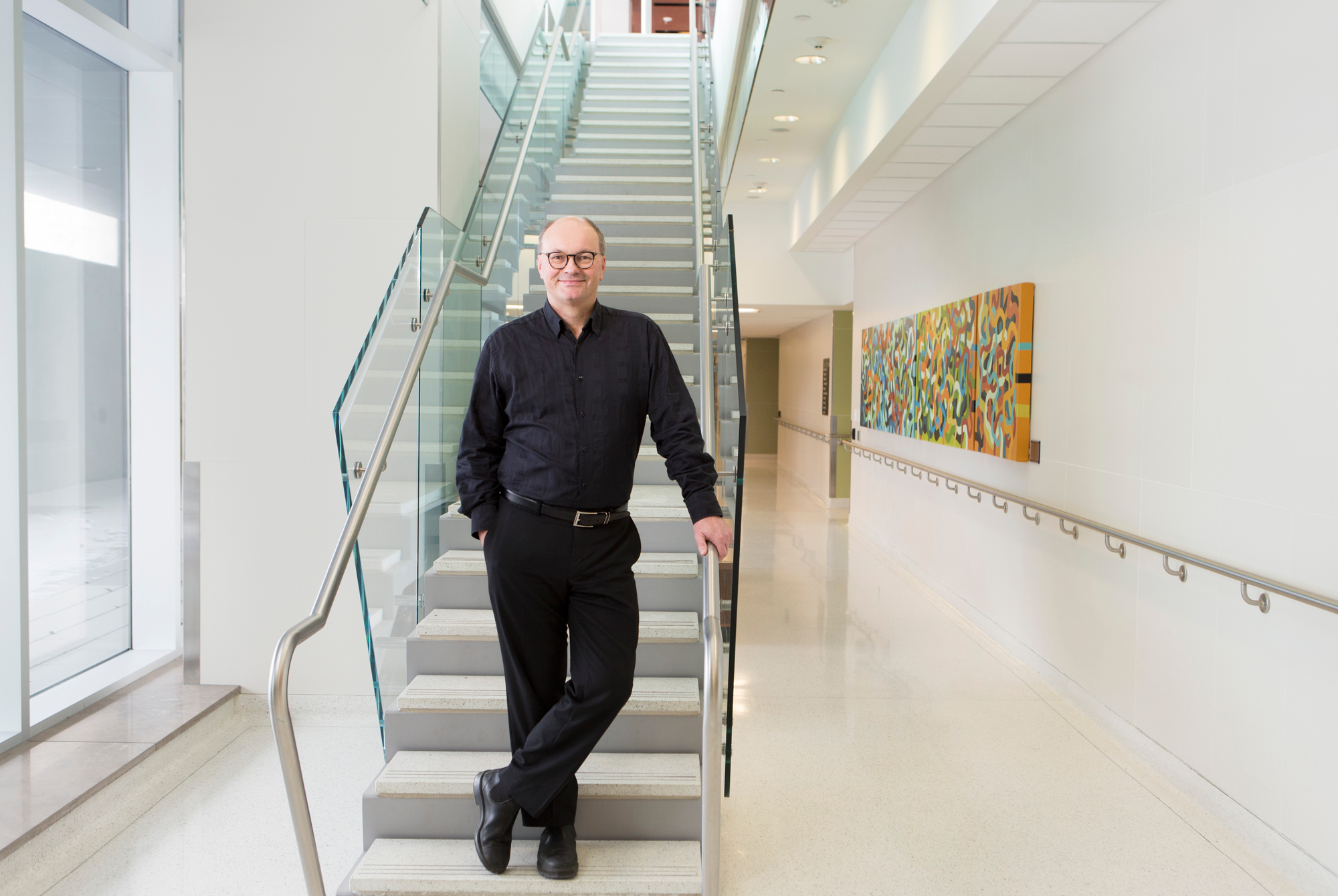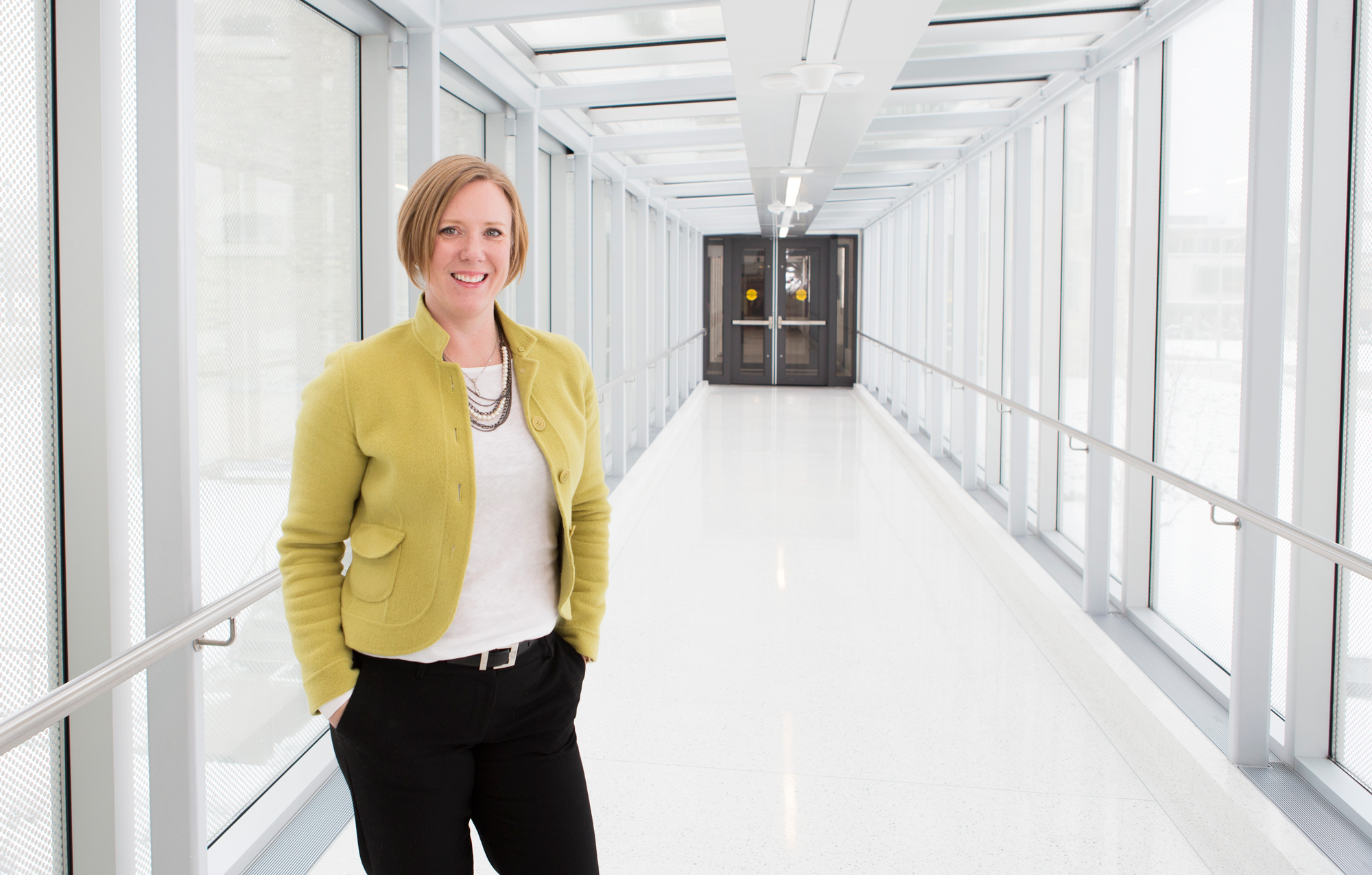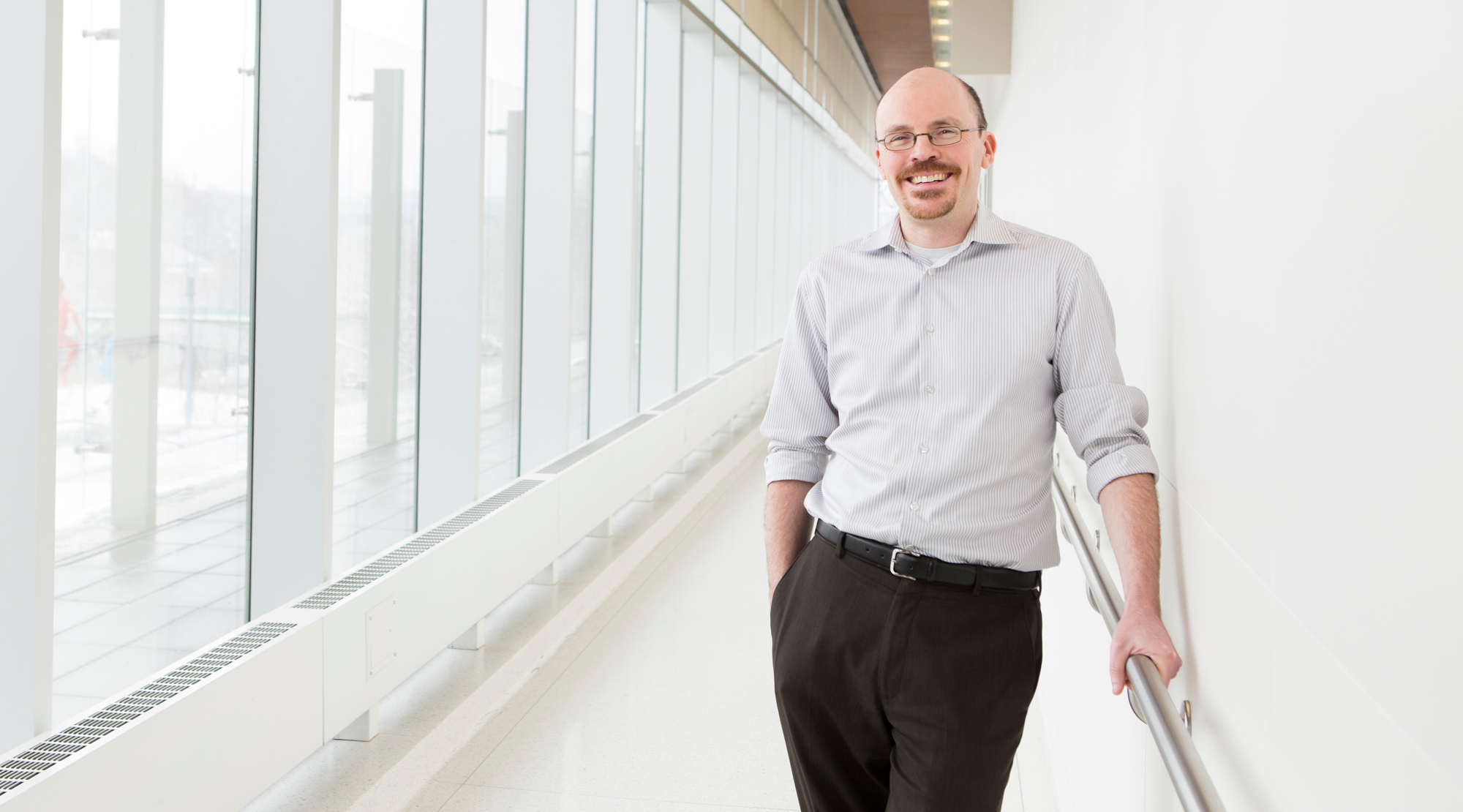
Written By: Riannon John
Photos By: John Packman
Dr. Ross Upshur is leading a team of researchers looking for a chance to change health care as we know it. A chance to give people the care they want and need more effectively and efficiently. A chance to treat patients more holistically — as real people, not just diseases. A chance to develop new models of care rooted in timely research.
And he sees Sinai Health System as the place to start that change.
As a practicing family physician, Dr. Upshur has first-hand knowledge of the strengths and weaknesses of our current health-care system. This perspective shapes not only the care he provides, but the research he conducts and leads as Assistant Director of Lunenfeld-Tanenbaum Research Institute (LTRI) and Director of the Collaboratory for Research and Innovation, now part of the LTRI.
In these roles, Dr. Upshur is leading the new health system services research pillar, looking at ways to improve care and outcomes for patients both in and out of hospital. His new role allows him to bring together research in this field from across Sinai Health System, building on the foundation he helped establish at the Collaboratory.
The Collaboratory is the only research centre in Canada dedicated to the study of chronic complex conditions. Dr. Upshur and his colleagues Dr. Kerry Kuluski and Dr. Michelle Nelson lead dozens of independent research projects at the Collaboratory, which is housed at Bridgepoint Active Healthcare, part of Sinai Health System. Along with their research teams, including several post-doctoral fellows, they are building evidence to improve care for medically complex patients.
“Complex patients are a very challenging patient group to treat,” Dr. Upshur says. “They have multiple conditions, or ‘multi-morbidities’ that mean they see a lot of different care providers. And they may be dealing with issues in their lives — like housing and food insecurity — that can negatively affect their health. Treating them properly requires a very different approach from the one we’ve traditionally taken, and we’re working to find ways to deliver better care to them.”
Finding these different approaches and care methods is at the heart of Dr. Upshur’s research and vision for Sinai Health System.
Q Why is complexity medicine so important right now?
A It is now the case that most Canadian patients have more than one chronic condition. These patients are now the rule, not the exception, and this trend will only increase as the population continues to age. We’re seeing significant growth in the number of complex patients with four or more concurrent chronic diseases. The fastest growing segment of the Canadian population is over the age of 80.
We’re also seeing many people in their 40s and 50s who have all the risk factors for multi-morbidities and our research shows that if you enter your late life-course as a high health services user, you stay there. Once people get past a certain threshold, they get very challenging and expensive to manage. Wherever possible, we need to address their issues upstream, before they become complex patients.
This is part of the very necessary transition to a new model. Our research shows that bringing together more members of the care team from across the spectrum — from acute, rehab and home care settings, as well as all the allied health professionals, like social workers, pharmacists and occupational therapists — the more effective and efficient our treatment can be.
We need innovation today, a way to repurpose assets that we already have to better match services to needs.
"Treating complex patients properly requires a very different approach from the one we've traditionally taken"
- Dr. Ross Upshur, Director, Collaboratory for Research and Innovation
Q How do complex patients benefit from your research?
A For very complex patients, we need a team-based approach that is interprofessional and concurrent. We’ve learned from speaking with these patients that in usual care, when they are sent out for multiple assessments from multiple specialists and other health-care providers, they get different interpretations of what is best for their health. They get confused and overwhelmed.
In our model, the entire care team works together to discuss the case with the patient and generate a unified care plan. As well, it is vital to elicit and clarify the treatment goals of patients and involve their family caregivers. Usually, patients just want to feel better. They are focused on having the best possible function and symptom management.
Working towards shared, defined treatment goals can shape care and ensure that patients have a positive experience. It can also help us make the best use of the available resources.
Patients and caregivers tell us that this approach helps them feel cared for and heard.
Q How can Sinai Health System help meet the needs of complex patients?
A Sinai Health System is well positioned to address this challenge. A large segment of our patients, across the System, are people with multi-morbidities. Now, we have the capacity to address all aspects of care, so we can start to reconfigure and reorient care models to better align services with needs and demand.
With expertise and resources in so many areas — including two family health teams in three locations — we can create a truly integrated care system. We can manage the full continuum of care, including primary, acute, rehabilitation and community. We have all the elements.
We’re also bringing together thought leaders through our Complexity Speaker Series, to start a larger conversation about how we can effectively respond to complex patients’ needs and work towards health system transformation.
It’s a big vision, and figuring out whether we’re achieving integration and how we can make improvements is an important applied research opportunity.
That’s what makes this the perfect moment to build on the LTRI’s reputation for excellence and to bring together lots of terrific health system services researchers from across Sinai Health System. We already have lots of great early career scientists working with us and they’re really leading the way — very few people are currently working in the field of complexity research.
Q What role does research play in bringing this vision to life?
A We need more research to help inform the development of Sinai Health System and the larger health sector.
This is applied research, using real patients with real problems. As we’re doing the research, we’re trying to figure out what the best model of care is, and how we can measure its effectiveness, what tools we need to enable people to deliver this type of care. And we can often see the results pretty quickly, since we’re working so closely with patients and their families.
My vision is to establish a health system services pillar that is as successful and flourishing as the LTRI’s basic science pillar. We want to continue to attract the best, the brightest researchers and give them the same kind of space to succeed and produce excellent research.
Being part of Sinai Health System also presents some significant opportunities. A number of departments — including emergency, family medicine, general internal medicine and human rights and health equity — have already expressed interest in participating in studies. That kind of collaboration can really help accelerate and elevate research.
Collaborating for change
At the Collaboratory for Research and Innovation, researchers explore some of the fundamental issues of complex care. While conducting independent lines of inquiry, the team also works together to build a more comprehensive understanding of the issues. With dozens of research projects on the go, ranging from collecting first-person accounts from caregivers on how they’re coping to launching volunteer-based bedside music programs, the team is leading the way on complex care investigation.
"Complexity is real people with real lives and real issues, accessing health care that may not match their needs. We're looking at the whole person, and trying to help make the system work for them."
- Dr. Michelle Nelson, Research Scientist

Above: Dr. Kerry Kuluski, Research Scientist
Exploring patient discharge delays
Research Scientist Dr. Kerry Kuluski’s research focuses on patient and family experiences in health care, and how they can be improved. One of her current studies looks at patients whose discharges from hospital or rehab facilities are delayed because the next point of care is not available. That includes patients who have no or insufficient home care support, are socially isolated or who are waiting to get a bed in a long-term care facility. Dr. Kuluski is studying who these patients are, why they have discharge delays and what the risk factors are for these delays. Her goal is to find solutions that can reduce or minimize these delays and help get these patients the support they need so they can go home. “Hospital discharge delays are a global health-care quality issue and demand much more research attention, particularly from the perspectives of patients and their caregivers,” says Dr. Kuluski.

Above: Dr. Michelle Nelson, Research Scientist
Establishing a complex stroke rehabilitation agenda
Stroke itself is a complex condition, and patients often have other health concerns. How does stroke rehabilitation account for the complexity of a patient’s medical and social situation? What are the gaps in the rehabilitation evidence for complex patients? These are some of the questions Dr. Michelle Nelson, Research Scientist, and her team are addressing through her research. Dr. Nelson brings together members of the international stroke community, including clinicians and patients, to identify essential questions and innovative approaches to address the gaps. “Clinicians use the best practice recommendations, but aren’t sure how well they match the patients they see every day,” says Dr. Nelson. “We’re looking for evidence, and in some cases building it, to help them deal with this uncertainty.”

Above: Dr. Shawn Tracy, Research Associate
Helping patients “Bridge to Home”
Shawn Tracy, Research Associate, works with Dr. Upshur and a large collaborative team on developing new models of care for patients with complex needs. He is now in the evaluation phase of a two-year research project called Bridge to Home. The project followed a cohort of complex patients and looked at how an integrated, interprofessional team model could help complex patients transition more smoothly from rehab back into the community. One patient they followed, for example, discovered that her apartment had been stripped of furniture shortly before she was discharged from Bridgepoint; the team helped rectify the situation once she brought it to her care team’s attention. Patients who don’t get enough support through transitions often wind up back in hospital, diminishing the value they get from the health-care system at great expense. “Transitions are a big challenge in the current system,” says Mr. Tracy. “Patients get high quality care in acute, rehab and home settings, but there are gaps between those sectors. That’s something Sinai Health System is well positioned to help address.”




